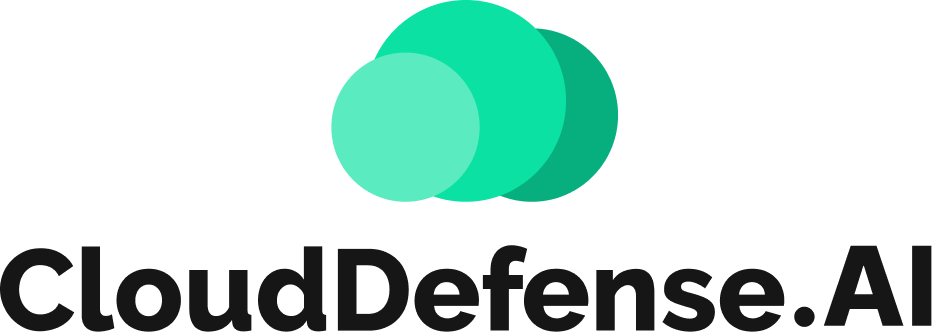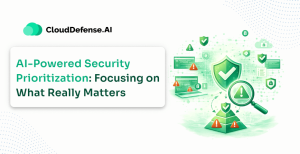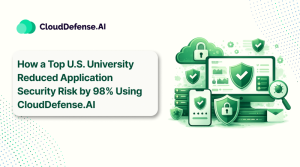Modern cybersecurity is evolving rapidly, fueled by AI-driven code generation and an advanced DevOps approach. While AI-based AppSec tools have been helping organizations to bolster their guardrails, it is failing to cope with the high volume of code changes and increasing complexity.
However, the advent of AI agents in cybersecurity has completely revolutionised the modern AppSec. It has enabled the organization to make a significant leap towards a dynamic and predictive AppSec approach.
Based on a study by Statista, 57% of organizations have already integrated AI in their anomaly detection systems. Whereas another research by Statista shows, more than 27% of companies are planning to implement AI in their cybersecurity strategy.
So it boils down to the question: how are AI agents in cybersecurity revolutionising AppSec? In this guide, we are going to explore how AI agents are making an impact in modern AppSec approaches and making cybersecurity a seamless task.
What are AI Agents in Cybersecurity?
AI agents are autonomous systems in cybersecurity that, by integrating into the development environment, act as an intelligent security assistant. It holds the capability to contextually analyze, reason, make decisions, and perform actions according to the given task.
The AI agent serves as a security co-pilot to the development and security team and takes commands from them for performing security tasks. Usually, all the AI agents utilise advanced ML, LLMs, and AI to analyze and autonomously perform security tasks.
These tools are highly dynamic as it is constantly learning from different data streams in real-time and adapting to the evolving cybersecurity environment. As a result, it is able to provide safety guardrails against varied types of threats, including injection attacks, cross-site scripting, and many nuanced security threats.
A unique aspect of AI agents in cybersecurity is that they can be configured according to the goal of the organization, maximizing the efficiency of the security. Unlike traditional security tools that provide alerts regarding potential threats, it presents you with alerts regarding actual threats.
Primary Benefits of AI Agents in Cybersecurity
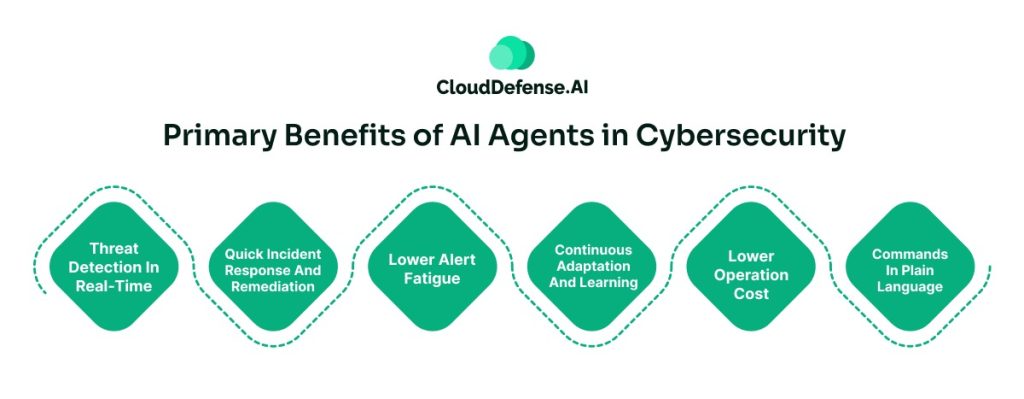
The integration of AI agents benefits the cybersecurity posture of an organization in many ways. These key benefits are:
- Threat Detection in Real-Time: AI agents as security assistants continuously monitor code changes, infrastructure, and user behavior to identify any flaws. It also assesses a huge amount of data in real-time to identify any malicious or subtle patterns that can produce zero-day attacks or insider threats.
- Quick Incident Response and Remediation: When an issue is detected, AI agents act autonomously and orchestrate the best possible remediation response. It analyzes the threat and takes remediation steps like isolating the device, revoking the credentials, rolling back deployments, etc. It enables the brand to reduce the incident response time and minimize overall impact.
- Lower Alert Fatigue: A huge advantage of AI agents in cybersecurity is their ability to perform autonomous triage to supply teams with security alerts that actually matter. It reduces the false positives in the alerts so that development and security teams can focus on solving complex and immediate issues.
- Continuous Adaptation and Learning: AI agents leverage advanced ML models to continuously learn from the latest threat intelligence streams, developers’ feedback, and other data streams. It not only allows the agentic AppSec tools to adapt to evolving threats and refine threat models, but also enhances the guardrails against zero-day attacks.
- Lower Operation Cost: With the adoption of AI agents, organizations can automate numerous operations in application security without requiring human intervention. It frees up the time for development and security teams, enabling them to focus on incident response and high-impact security alerts. It lowers operational costs by a significant margin as it saves them from breaches and recovery.
- Commands in Plain Language: Many AI agents are designed to serve as an AI security assistant in the AppSec program. They enable developers and security professionals to put commands in plain English and perform their security tasks. Importantly, it allows everyone to carry out different commands without needing to learn any security jargon.
How AI Agents are Revolutionizing AppSec
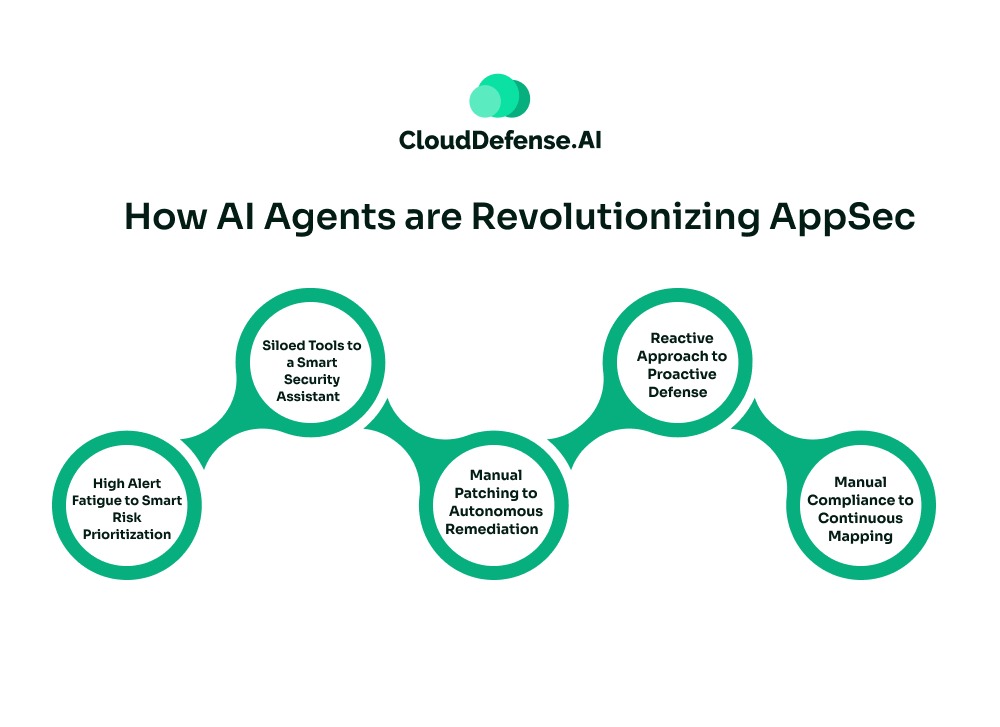
For a long time, application security needed a security intelligence that would constantly stay by the side of the team and orchestrate all the security processes. The advent of AI agents in cybersecurity filled the gap and completely revolutionised how teams approach application security. Here is how AI agents are transforming AppSec:
High Alert Fatigue to Smart Risk Prioritization
Traditionally, AppSec scanners used to provide developers with floods of alerts. It scanned the application based on a specific pattern matching and prioritised them according to the CVV score. What caused it?
- Manual Triage: It made the teams manually triage the alert to find out which was an actual alert.
- High False Positives: Since the tool doesn’t have context of the code or the application’s function, it creates a false alarm even from subtle variations from known patterns.
However, the arrival of AI agents as security assistants has completely revolutionised the process with autonomous triage. These agents have a contextual understanding of all changes in the application, and they are based on advanced LLMs.
AI agents perform analysis of the application’s architecture, data flow, and runtime environment to understand its reachability, exploitability, and business impact. Importantly, it also correlates the security findings from different AppSec tools to intelligently triage the alerts. Based on the assessment, it performs smart prioritisation and presents the team with the most impactful threats while filtering out false positives.
Siloed Tools to a Smart Security Assistant
To address security during application development, developers had to switch from their IDE to different tools with a complex dashboard. This led to:
- Increased Complexity: The large number of siloed tools forced developers to switch context for security tasks, increasing complexity.
- Security as an Afterthought: The complicated dashboard of different tools and the necessity to have sound cybersecurity knowledge made application security an afterthought.
AI agents, through integration in the development environment, completely eliminated all the roadblocks. The agentic AppSec acts as an intelligent assistant that always stays inside developers’ tools.
It provides the developer with a chat command that is everywhere in the development environment. While writing code, developers have to provide commands in plain English, and the AI agent will perform the security task automatically.
Based on the command, the AI agent runs the scan, performs deep contextual analysis, correlates data, and provides reports accordingly. They are fast, responsive, and perform all the security tasks in real time, helping teams maintain a security-first culture.
Manual Patching to Autonomous Remediation
AI agents in cybersecurity are designed not only to identify security incidents but also to fix them autonomously. Previously, developers had to wait for tickets from security professionals to fix any vulnerability.
Not only did developers have to spend hours understanding it, but they also had to switch from the IDE to remediate the threat. The arrival of AI changed everything. As a security assistant, it can understand and react autonomously to security threats in the application without requiring human intervention. When a vulnerability is identified, AI agents perform:
- Contextual Analysis: When AI agents in cybersecurity identifies a vulnerability, it performs contextual analysis of the surrounding code, business impact, and the developer’s intent. Based on the probable impact and functionalities, it creates a context-aware remediation process.
- Automated Remediation: Based on the command and complexity of the threat, the AI agent proposes the remediation steps with a complete explanation or automatically fixes it. The remediation suggestions are directly fed to the developer’s working environment or as a pull request. Some advanced AI agents like QINA Pulse can even automate the complete remediation process and fix the threat automatically without human intervention. As a result, it drastically reduces the incident response time and helps developers to solve the vulnerabilities within a few minutes.
Reactive Approach to Proactive Defense
The traditional AppSec strategy was only about a reactive approach. Security tools allowed teams to react to only known vulnerabilities. It was not possible to identify and remediate zero-day threats or nuanced vulnerabilities.
But AI agents made the complete transformation by hunting down all the security vulnerabilities in the application, along with issues in business logic. Modern AI agents leverage:
- Behavioral Analysis: Unlike traditional AppSec tools, AI agents perform behavioral analysis by creating a behavioral baseline for the application. A subtle deviation from the baseline can help the AI agents identify novel attacks. It is highly useful in protecting the application against zero-day threats and complex business logic attacks that traditional tools can’t detect.
- Data Processing and Aggression: AI agents, by integrating into the AppSec environment, ingest vast amounts of data from different sources. It gains insight from networks, endpoints, cloud logs, and many other sources. As a result, it is able to identify any vulnerabilities, especially zero-day threats, in real-time before they can make an impact on the application.
An AI agent doesn’t wait for the threats to make an impact; rather, it proactively searches for the threat autonomously.
Manual Compliance to Continuous Mapping
Complying with regulatory requirements and industry has always been a time-consuming and cumbersome task.
Whether it is SOC 2 or GDPR, teams have to go through rigorous processes to ensure continuous threat modeling and maintain compliance. With the arrival of AI agents, organizations didn’t have to rely on a manual approach. It offers teams with:
- Real-Time Mapping: AI agents deliver real-time mapping, where they continuously map all the deviations, security controls, and weaknesses with respect to all regulatory requirements. It autonomously performs mapping based on command and immediately puts an alert when an issue doesn’t adhere to regulatory requirements.
- Adaptive Threat Modeling: AI agents also hold the ability to automatically update the application’s threat model as the architecture evolves or new features are added. The adaptive threat models help in uncovering possible attack vectors that may arise with the addition of features or architectural upgradation.
AI agents always make sure the organization stays compliant with all the regulatory requirements with minimal human intervention.
AppSec Future with AI Agent: QINA Pulse
AI agents in cybersecurity are no longer a futuristic concept. Agentic AppSec tools QINA Pulse are making it accessible to every organization. It is a powerful AI security assistant that always stays by the side of the developer by integrating directly into the IDE.
Pulse not only helps them to perform different AppSec tasks with simple English commands but also automates most security aspects of the application. It serves as an intelligent AI co-pilot that helps developers with numerous tasks, spanning from identifying threats and creating tickets to generating compliance reports.
The integration of AI agents like QINA Pulse promises organisations a massive transformation that ensures security at the speed of application development. With the advancement of AI agents and agentic orchestration tools like QINA Pulse, the AppSec scenario is transforming rapidly. It is enabling organizations to stay ahead of modern cyberthreats while adapting to high-pace application development trends. Intrigued by QINA Pulse and want to know more? Book for a free live demo now!
